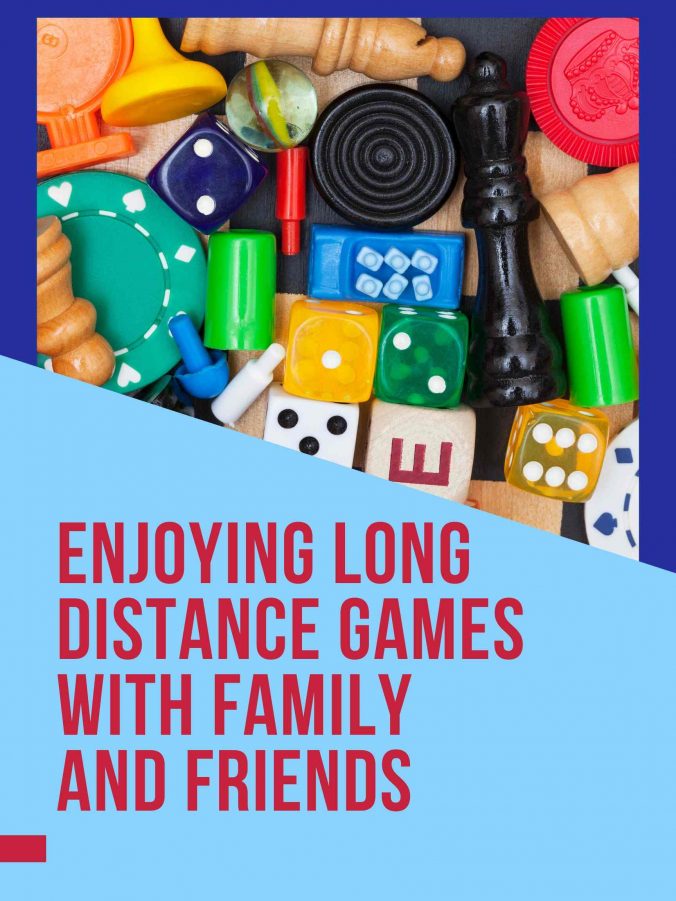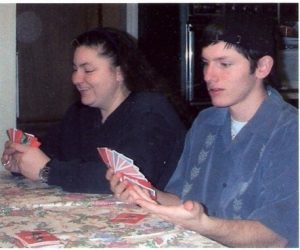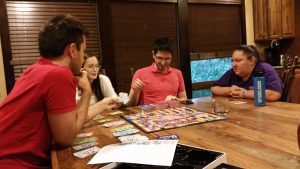There is so much going on these days that seems outside of our control. Depending on which parts of your life have been turned upside down, you may find yourself having more time or less time that you are trying to fill. Even though my current schedule doesn’t include getting in a car and driving to the other side of town as many as seven days a week, I have found that my “free” time seems to be decreasing rather than increasing. But maybe that has more to do with how I am prioritizing it these days than anything else.
Communication is Critical
One of the things that has become more and more important to me is communication – communicating with family and friends across the country and across the world. Thankfully with the technology we have these days, staying in touch has become so much easier. The people we care about are just a phone call, text, WhatsApp message, or email away.
And by virtue of the fact that you are reading this blog post, I can probably assume that you have access to technology in one or more of those forms. And that’s great, because I’m going to encourage you to use that technology in a positive manner beyond just basic communication.
As you consider how best to stay in touch with those you care about, I want to suggest that you think beyond just having a conversation with them to having fun with them! And I know of no better way to do that than through games. My family has always loved games. When we get together it is seldom a question of if we will play games, but rather a question of when, which ones, and for how long.
Liven Things Up with Games
In the midst of the current crisis we have discovered new and innovative ways to bridge the miles that separate so many of us, while still getting in our game playing. And by the use of the various types of technology we all have access to, we have been able to play games with anywhere from two of us to more than a dozen at a time. Some of the games have been a little more challenging to accomplish when we’re not all sitting across a table from each other, but some have actually been fairly easy to do this way. I have hopes that we will continue to do some of these long distance games even after all of this goes away.
The most basic games can be played with just a phone call. I have been very appreciative of the fact that all of my family members have cell phones with unlimited minutes and unlimited long distance (even internationally when we make WiFi calls). I bet some of you don’t even remember when long distance calls were expensive and minutes on cell phones had to be monitored! Fortunately, we’re beyond that now, and calling someone across the country and talking, laughing, and playing games for an hour or more is very easy and very doable.
Basic Games with a Phone Call
So far this month we have played three different games using just a simple phone call: Yahtzee, Quixx, and Speed Scrabble. In all three cases, each of us, on each end of the call had the dice (for Yahtzee and Quixx) or the letters (for Speed Scrabble). I don’t see any way you could get around each having letters for Speed Scrabble (unless of course you went to purely electronic, and that’s not been our goal here), but I suppose you could actually play Yahtzee and/or Quixx with only one person having dice – as long as you were okay with them doing all of the rolling and just letting you know what they rolled. (We might actually be trying that sometime soon with Quixx, since we have family members overseas that enjoy the game as much as we do, but who don’t have the requisite dice to play it!)
To play those or similar games, decide on a good time, get your materials out on each end, place the call, put your phones on speaker, and have at it. Even without being able to see each other, it is fun to be talking and playing together, especially when it’s a game you love, with a person you love even more.
Games with Video Calls – and Multiple Copies of the Game
The next category of games are ones we have been playing with some type of video calls. (I have personally used WhatsApp video chats and Zoom calls to accomplish this, but anything you have that will allow you to see each other should work – I would imagine FaceTime and Skype would work in similar ways, we just happen to be partial to the other two.)
I would actually divide “games played with video” into two separate categories: those where each family has to have their own copy of the game and those where only one “central” copy is needed.
I think at this point we’ve actually played more games where each family has their own copy. So far, I have played Azul, Splendor, Sagrada, and Dominion that way. And several other family members played Settlers of Cattan. I’m not a big Settlers fan, so I can only tell you that they’ve enjoyed it enough to play it several times. (And, by the way, while thus far it’s worked out that we’ve limited those games to just two groups of people, there isn’t any reason you can’t play with a group call going to three or four different places, or more, depending on the game. We’re hoping to do that with Azul soon.)
Example: Azul
With most of those games (Splendor being the exception from the above list), it was actually fairly simple to set up our “boards” (or cards or whatever the game’s equivalent is) on each side of the call. I’ll give you an example of how that worked: With Azul, we each had our own boards in front of us, and then we also pulled out a board for the person(s) at the other end. In that game people take turns choosing tiles from several locations in front of them. On this particular occasion I drew the twenty tiles out of my bag, placing them into their respective places in front of me. As I did that, I informed my sister of which tiles I had pulled out and where they were being placed. She mirrored what I was doing. As we took turns drawing and placing tiles, we would mirror the action on both sides of the call. (Now that I think about it, the video aspect for this particular game was a nice extra feature, so we could see each other, but it wasn’t critical. We told each other what we were doing more often than showed each other.)
Game play like that tends to take a little longer than if everyone was in the same room, since everything is having to be communicated and then done at both ends. But for games like Azul, Sagrada, and Dominion, it wasn’t much additional time.
The types of games that we have found that lend themselves to playing like this are ones where it is easy to mimic what’s being done by the other person (in other words, your “draw” pile (of cards, dice, or tiles) have a fairly limited variety of types, so that finding and matching what the other person has done goes fairly quickly. Games like Monopoly would be easy to do this way too.
Example: Splendor
I was a little skeptical about how the mechanics of playing a game like Splendor would go in this long distance fashion, since it has so many more “moving pieces” than the other similar games we had played (only three decks of cards – but one of them has 42 different cards and the other two have dozens each!). But once we got going it went surprisingly well! This time my sister had the “main board” at her end. As she turned over a new card for her board, she would tell us what it was, we would find it at our end, and mirror her activities. After determining a way to organize each of the three decks we were able to find the matching card fairly quickly. While it definitely added more time than with the other games we had played in a similar fashion, it was still not bad.
So if you have favorite games that are owned by family members in various locations, take a look and see if they can be played this way, with a mirroring style of play. I think you’ll find it opens up brand new ways to enjoy time together!
Playing Card Games?
Before I move to the last category of games, I want to mention card games – you know the old fashioned 52 cards in a deck type. Unfortunately, I don’t think most card games lend themselves to long distance playing in this manner. But we did come up with one card game that should work just fine – Hand and Foot. While you would normally shuffle lots of decks together to play from a central pile, it also works just fine to have everyone playing from their own draw piles. We’ve done it with two decks per person, and that worked great. (We might try playing with partners sometime, but only if there are the same number of people at each location that can play together on the same table. So far we haven’t had that set up, but maybe some day!)
Games with Video Calls – with One Copy of the Game
And finally, there are the group games that can be played with just one central copy of a game. We’ve already come up with a pretty long list of these games. The first one we played was CodeNames. As I think about it, even though we were using video chats to play the above games, CodeNames was actually the first game we played that did require some sort of visual. If you aren’t familiar with the game, it starts with twenty-five cards laid out in a five by five matrix. There are two teams, and each team is trying to get their team members to find their group’s cards by giving them clues. Everyone is going to have to be able to see the layout of the cards. Since we have family members with an iPad, it was easy to set up the tablet to look down at the arrangement and constantly “stream” it to all of us. As cards get selected, they then get covered, so you need to be able to track the changes that get made to the “board” as guesses are made. You could do that without a video chat, if you got really creative with pictures on your phones, but I’m confident that the video makes it easier, and is a readily available option to almost anyone these days.
Other Game Options
Other games we have played this way, or plan to play, include Scattegories, Hit or Miss, Six Word Memoir, Wits and Wagers, and some form of Pictionary. (Did I mention we have LOTS of games?!?) And we’re still working on how to play Cranium this way!
Once again, now that I think about it, most of those games could actually be played with just a phone call if you don’t want to mess with a video chat. Not Cranium, of course, and probably not Pictionary! But come on, you really needed an excuse to see each other, didn’t you?
I hope some of these ideas are helpful in giving you and your loved ones some new ways to connect! If I’ve left out any of your favorite long distance games, please let me know. And if you have specific questions about how we played any of these, let me know that, too. The goal is to encourage everyone here, not to discourage you!
Have fun. Keep safe and keep sane.
Cathy
P.S. – One month in we’ve played 17 different games like this with family and friends across the city, the country, and around the world, and have many more on our list to try in the future!





 Specifics: Chess
Specifics: Chess

